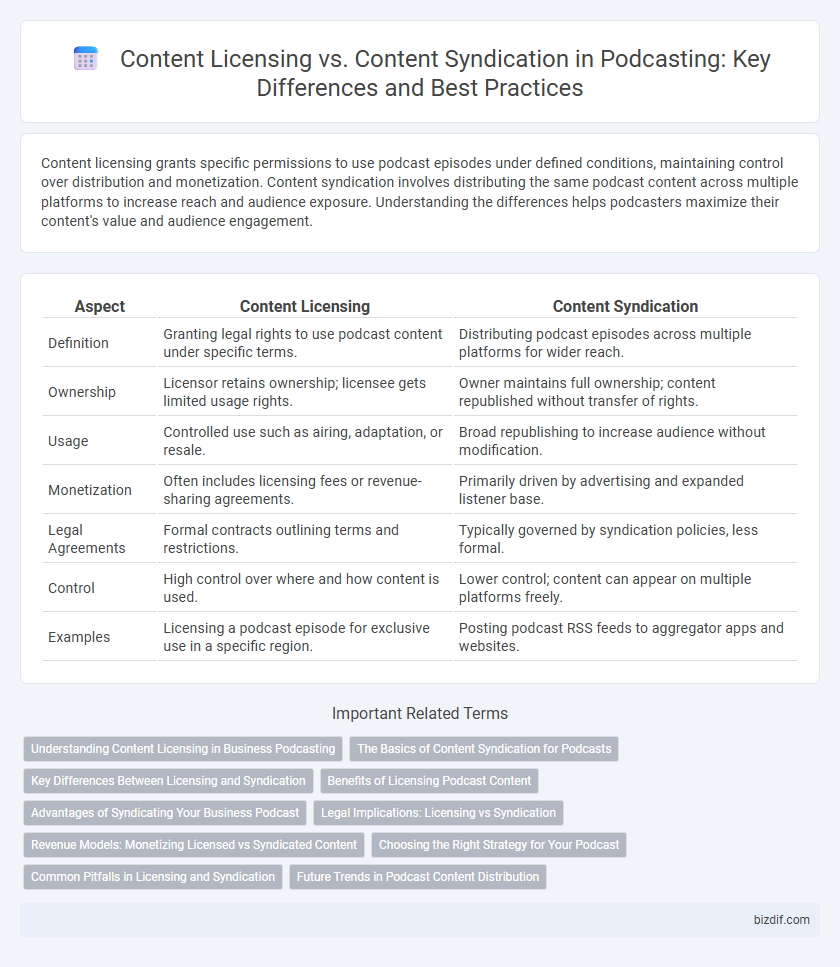Content licensing grants specific permissions to use podcast episodes under defined conditions, maintaining control over distribution and monetization. Content syndication involves distributing the same podcast content across multiple platforms to increase reach and audience exposure. Understanding the differences helps podcasters maximize their content's value and audience engagement.
Table of Comparison
| Aspect | Content Licensing | Content Syndication |
|---|---|---|
| Definition | Granting legal rights to use podcast content under specific terms. | Distributing podcast episodes across multiple platforms for wider reach. |
| Ownership | Licensor retains ownership; licensee gets limited usage rights. | Owner maintains full ownership; content republished without transfer of rights. |
| Usage | Controlled use such as airing, adaptation, or resale. | Broad republishing to increase audience without modification. |
| Monetization | Often includes licensing fees or revenue-sharing agreements. | Primarily driven by advertising and expanded listener base. |
| Legal Agreements | Formal contracts outlining terms and restrictions. | Typically governed by syndication policies, less formal. |
| Control | High control over where and how content is used. | Lower control; content can appear on multiple platforms freely. |
| Examples | Licensing a podcast episode for exclusive use in a specific region. | Posting podcast RSS feeds to aggregator apps and websites. |
Understanding Content Licensing in Business Podcasting
Content licensing in business podcasting grants legal permission for others to use, distribute, or monetize podcast episodes, enabling creators to maintain control over intellectual property while expanding reach. Licensing agreements typically specify usage rights, duration, geographic limitations, and compensation, which protect both podcasters and licensees from unauthorized use. Understanding these terms is crucial for podcasters seeking revenue streams through third-party partnerships without relinquishing ownership or brand integrity.
The Basics of Content Syndication for Podcasts
Content syndication for podcasts involves distributing your episodes across multiple platforms to expand reach without creating new content. This strategy increases audience exposure by allowing third-party networks or apps to republish your podcasts while retaining original ownership rights. Unlike content licensing, which grants permission for specific uses under agreed terms, syndication emphasizes broad accessibility and consistent branding across diverse channels.
Key Differences Between Licensing and Syndication
Content licensing grants podcasters specific rights to distribute or use their episodes, usually restricted by duration, territory, or platform, while content syndication involves distributing the same podcast episode across multiple platforms or networks to maximize reach and audience. Licensing often requires formal agreements detailing usage permissions, whereas syndication emphasizes broad and automated distribution without directly transferring exclusive rights. The key difference lies in control and exclusivity--licensing offers tailored permissions and potential revenue through usage rights, while syndication focuses on wide exposure and audience growth through simultaneous multi-platform availability.
Benefits of Licensing Podcast Content
Licensing podcast content allows creators to retain ownership while granting specific usage rights to third parties, ensuring consistent brand representation and quality control. This approach generates diversified revenue streams through licensing fees and expands audience reach without relinquishing content exclusivity. Licensed content can also enhance partnerships, enabling tailored distribution across various platforms while protecting intellectual property rights.
Advantages of Syndicating Your Business Podcast
Syndicating your business podcast expands audience reach by distributing episodes across multiple platforms, increasing brand visibility and engagement. It enables seamless integration with various content hubs, boosting SEO rankings through diverse backlinks and higher listenership metrics. Syndication also provides ongoing exposure without additional content creation, maximizing the return on podcast production investment.
Legal Implications: Licensing vs Syndication
Content licensing in podcasting grants specific rights to use, distribute, or reproduce episodes under defined terms, ensuring content creators retain ownership and control, which involves formal agreements to avoid copyright infringement. Content syndication involves distributing podcast episodes across multiple platforms or publishers, often under broader permissions but may lead to complex legal challenges related to rights management and revenue sharing. Understanding the legal implications is crucial for podcasters to protect intellectual property, prevent unauthorized use, and establish clear monetization frameworks.
Revenue Models: Monetizing Licensed vs Syndicated Content
Content licensing generates revenue by granting other platforms the rights to distribute podcast episodes, often through upfront fees or revenue-sharing agreements. Content syndication monetizes by allowing multiple outlets to broadcast the same podcast, typically earning income from ad impressions and sponsorship deals tied to the syndicated content. Both models offer distinct monetization paths, with licensing emphasizing exclusive distribution rights and syndication leveraging broader audience reach for increased advertising revenue.
Choosing the Right Strategy for Your Podcast
Content licensing grants exclusive or non-exclusive rights to third parties to distribute, reproduce, or monetize your podcast episodes, offering controlled revenue streams and brand protection. Content syndication involves distributing your podcast across multiple platforms to maximize reach and audience growth without exclusive ownership transfer. Choosing the right strategy depends on your goals for revenue, control, and audience expansion, with licensing favoring monetization and syndication emphasizing widespread exposure.
Common Pitfalls in Licensing and Syndication
Common pitfalls in content licensing and syndication for podcasts include unclear rights agreements leading to disputes over usage scope and duration. Many creators overlook the importance of specifying geographic and platform restrictions, which can result in unauthorized distribution. Failure to monitor syndication partners often causes inconsistent branding and loss of quality control across multiple outlets.
Future Trends in Podcast Content Distribution
Content licensing in podcasting involves granting rights to third parties for specific use, ensuring legal control and monetization of original episodes. Content syndication distributes podcast episodes across multiple platforms to maximize reach and audience engagement without exclusive restrictions. Future trends indicate a rise in AI-driven syndication platforms and blockchain-based licensing to enhance transparency, automate royalties, and expand global distribution exponentially.
Content licensing vs Content syndication Infographic

 bizdif.com
bizdif.com